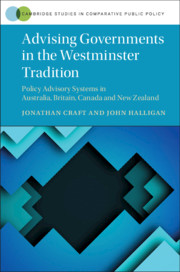 Advising Governments in the Westminster Tradition
Advising Governments in the Westminster Tradition Book contents
- Reviews
- Advising Governments in the Westminster Tradition
- Cambridge Studies in Comparative Public Policy
- Advising Governments in the Westminster Tradition
- Copyright page
- Dedication
- Contents
- Figures
- Tables
- Acknowledgements
- Glossary and Acronyms
- 1 Policy Advisory Systems
- 2 Comparative Contexts
- 3 Approaches to Understanding PAS and Change over Time
- 4 Public Services and Policy Advice
- 5 Ministerial Partisan Advisers and the Politicisation of PAS
- 6 Alternative Advice from within Government
- 7 External Advice
- 8 Understanding Westminster PAS Change
- 9 Trends, Tensions and the State of Neo-policy Advisory Systems
- Book part
- Notes
- References
- Index
7 - External Advice
Published online by Cambridge University Press: 18 December 2020
- Reviews
- Advising Governments in the Westminster Tradition
- Cambridge Studies in Comparative Public Policy
- Advising Governments in the Westminster Tradition
- Copyright page
- Dedication
- Contents
- Figures
- Tables
- Acknowledgements
- Glossary and Acronyms
- 1 Policy Advisory Systems
- 2 Comparative Contexts
- 3 Approaches to Understanding PAS and Change over Time
- 4 Public Services and Policy Advice
- 5 Ministerial Partisan Advisers and the Politicisation of PAS
- 6 Alternative Advice from within Government
- 7 External Advice
- 8 Understanding Westminster PAS Change
- 9 Trends, Tensions and the State of Neo-policy Advisory Systems
- Book part
- Notes
- References
- Index
Summary
The externalisation dynamic widely attributed to these four systems is analysed here. External advisers are an important consideration in how policy advisory systems (PAS) operate and figure in analysis of their evolving nature. The external category is expansive, but this chapter is limited to analysis of two major external advisory units – think tanks and private sector consultants – with some attention paid to lobbyists and international bodies. There is consideration of the changing nature of the external environment as an important source of pressure on governments to open up or integrate external advice. The focus is on the displacement of public service advisers by outsiders and the shifts in influence to external units. Comparative analysis reveals important differences in the prominence of externals agents and underscores the elasticity of PAS and the Westminster tradition. Some countries and governments favour think tanks or consultants; others are more insular. Externalisation can arise because ministers are dissatisfied with internal advice or agendas driven by ideological preferences for smaller, more efficient government. Externalisation also functions as a pressure on government, which derives from international agencies, agreements, or contexts (e.g., Brexit) or from domestic proponents of ‘open’ government and policy.
- Type
- Chapter
- Information
- Advising Governments in the Westminster TraditionPolicy Advisory Systems in Australia, Britain, Canada and New Zealand, pp. 134 - 158Publisher: Cambridge University PressPrint publication year: 2020
